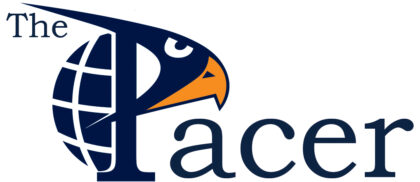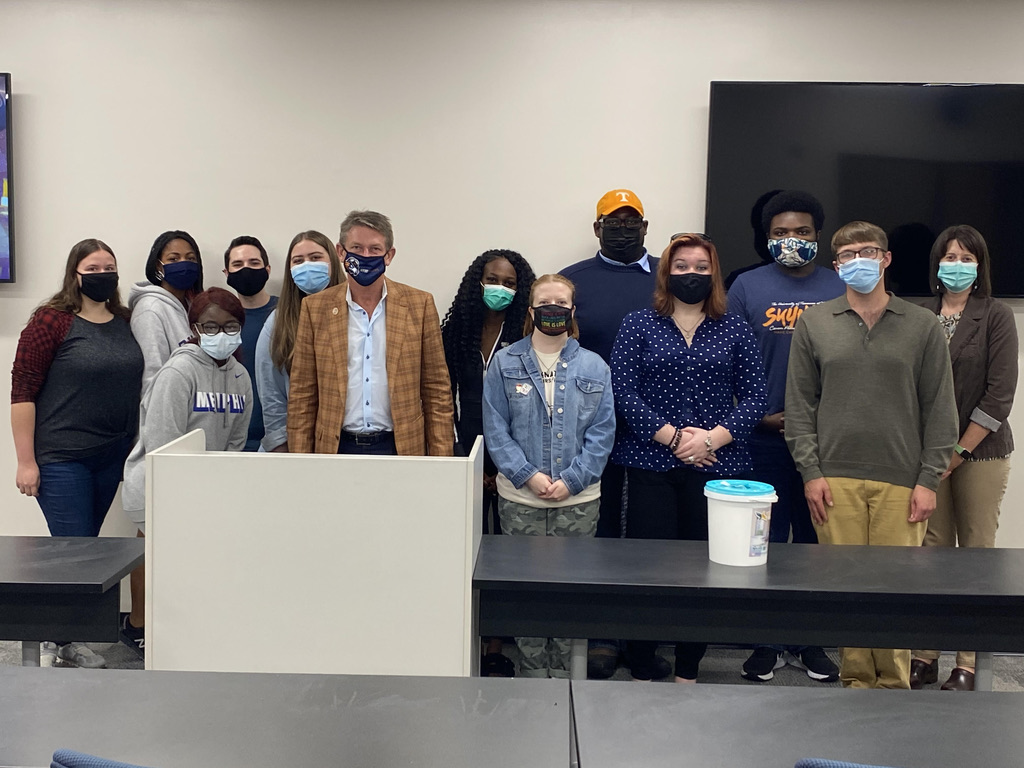UT System President Randy Boyd visited UT Martin Tuesday, October 26, 2021. Boyd spoke to Dr. Carrie Humphrey’s International Law and Organizations class about his international business experiences and offered insights on the future of higher education across UT campuses.
A variety of topics were covered ranging from vaccine mandates to how domestic and international law has affected Boyd’s businesses. Students and faculty were able to ask questions after Boyd’s introduction.
Boyd’s interest in international business started at a young age, when he participated in children’s international summer village at age 11. After graduating college, Boyd went to work as director of international sales with his dad’s company, which manufactured handheld electric bug killers. During that two-year period of time, he travelled to 46 countries making business prospects abroad.
Following some difficulties at his father’s company, Boyd started a distributing company and ran it for six years. Customers kept requesting the invisible fence product, but the company wouldn’t sell to Boyd, so he capitalized on the expiration of the patent and started his own.
Boyd Family Vineyards started out as a passion of Boyds, to climb the highest mountains in each continent. The highest mountain in South America is Aconcagua in Argentina with a summit of 22,838 feet. He had made it to 21,000 feet eight days into the trip and couldn’t reach the summit due to thunderstorms combined with below freezing temperatures. Boyd returned to the nearby city of Mendoza awaiting departure and decided to tour some of the 500 wineries within a 50 mile radius. Boyd Family Vineyards is part of a cooperative where he owns a 5 acre share. They make about 3,000 bottles a year; the wine is sold exclusively in the Nashville and Knoxville areas. Boyd said that the majority of his wine (2,700 bottles) becomes his possessions, and can’t resell at that point, so he donates to charity and shares with family and friends.
“Today we’ll do about $800 million in sales, employee over 1,000 employees, over 4,000 products including the invisible fence brand , because we were able 10 years later to go back and buy the company that wouldn’t sell me their product back in the day which was kind of fun thing to do.”
Boyd said the current supply chain shortages were the worst he’s experienced in 30 years in business; however demand is high and is hard to meet, as sales were up 25% last year.
After examining a Chinese competitor’s product, Boyd and his purchasing agent flew to Hong Kong in 1993 and spent three weeks visiting manufacturing plants and made arrangements to source raw materials from China while keeping manufacturing in the U.S. By 1997, Boyd had moved assembly to China, shortly thereafter he got rid of his warehouse and partnered with a third party logistics service in Indianapolis. Concerning labor trends and shady government officials caused the company to expand production into Vietnam, where about half of their products are made to date.
Boyd said his business will do 15% of its sales, or some $100 million in sales internationally, with Europe being the primary market.
He also highlighted how companies and consumers alike are moving away from distributors and towards online vendors like Amazon.
Boyd said he had a very strong, unpopular opinion that would solve the labor shortage in the US: immigration.
“There are millions of people, working age with talent, who would love to come to the United States; the problem is it’s not very politically popular,” said Boyd.
University enrollment down 15%, and community college enrollment down 22%
Boyd said it would be difficult to bring manufacturing jobs back to the United States as there are no producers of raw materials in the states.
“We wouldn’t be in business if we didn’t have partners in other countries,” Boyd said.
Boyd said the biggest deciding factor in outsourcing production overseas was cutting production costs.
“A circuit board for my receivers (that go on the dogs) I could make in China for $5.25, I had a supplier in North Carolina that could make it for $26. It wasn’t like I was saving a few pennies,” said Boyd.
Boyd elaborated about how ongoing supply chain issues have impacted his company, Radio Systems Inc. The company brings in about 100 containers, 40 foot trailers, a month. For the past ten years, the average cost of a standard-size cargo was container was about $3500 and last month, the cost of a container was up to $20,000, which is eating up most of the company’s profits.
Three months ago, Boyd’s Vietnamese factory was shut down for two months following a coronavirus surge in the country.
“I haven’t talked to a single person in business that isn’t affected by current supply chain issues or labor shortages,” Boyd said.
There has also been difficulty locating microprocessor chips for the collars, the same chips used in cars and gaming consoles.
Boyd was then asked about the status of mandating the COVID-19 vaccine on UT campuses. According to the recent executive order, anyone in contact with a federal contractor will be required to show proof of vaccination.
The COVID vaccine mandate is a “very vague, undefined executive order and we are wrestling every day with trying to figure out exactly who is going to apply to and what exemptions will be in place.”
You must be vaccinated if you work around a federal contractor directly or indirectly, this would apply to any faculty or staff in the same building with a contractor. The Tennessee legislature is actively trying to block the mandate, but Boyd doesn’t think they will be successful in the case of the UT system. There’s a current deadline of December 8, where UT must attest all employees working on or around a contractor are fully vaccinated. There are three possible exemptions: if you don’t work in a building with a federal contractor, a medical exemption, and a religious exemption.
At UT Knoxville around 90% of their buildings will be required to show proof of vaccination, whereas UT Southern in Pulaski has no federal contractors. The UT Health Science Center has attested that 100% of their employees will be vaccinated, so it’s very much dependent on the campus.
Boyd said the UT system wasn’t trying to fire anyone over the mandate.
“We are allowed to make reasonable accommodations …our approach is going to be one of compassion and accommodation … we can require the unvaccinated to meet current CDC guidelines which is wearing a mask and staying six feet apart.”
Boyd said there wouldn’t necessarily be many buildings at UT Martin that would meet the contractor requirement.
Boyd advised anyone interested in starting a business to “just do it,” that it’s easier to start when you’re young and don’t have much to lose; he started his first company in his grandmother’s basement in his 20’s.


